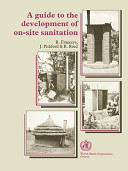
A Guide to the Development of On-site Sanitation
By - Franceys, R. , Pickford, John Aston
Floor
-
Floor 2
Published
-
World Health Organization, Geneva, 1992
ISBN 10 - 9241544430
ISBN 13 - 9789241544436
Book Status
-
1 Qnty Available with us.
Subject
-
Outhouses
Shelf No
-
12
Call Number
-
628.742 FRA
Physical Description
-
viii, 237 pages : illustrations ; 26 cm
Notes
-
Include Index